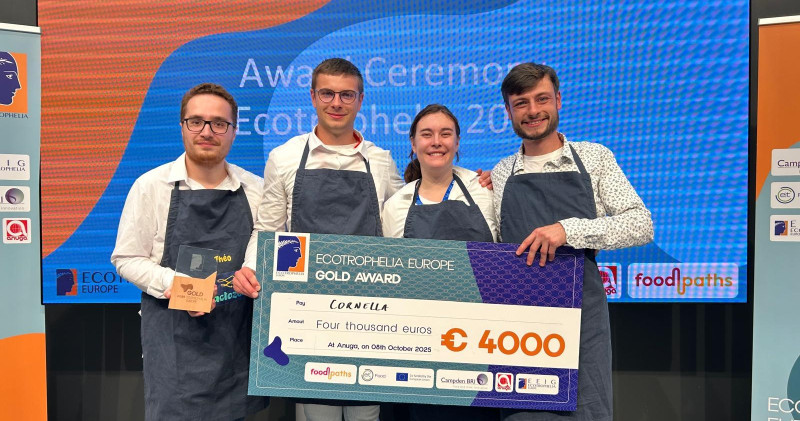In a small country like Belgium, our food companies think —and act — big. With quality, innovation, and sustainability at their core, Belgian food and drinks stand out across the world. At Anuga, the largest international food and drinks trade fair, more than two hundred Belgian companies showed once again that innovation is our most flavourful export. We spotted four major trends and eight Belgian innovations that bring them to life.

1. Healthier choices that never compromise on taste
Consumers want healthier products. But they also want great flavour. They choose foods with natural ingredients and clear origins, yet still expect to be surprised. These three Belgian products prove that health and indulgence can go together perfectly.
Yolloh introduces inclusive candy with an intense, fruity taste. It’s ideal for consumers looking for sweets without sugar, gelatine, gluten, or honey.

Frédéric Blondeel developed a chocolate spread with 65% roasted hazelnuts — around 50% more than in typical chocolate spreads. The result is a richer nut flavour and less added sugar.
Univers Drink shows that conscious choices can shine in taste too. Their Belgian mojito mocktail, awarded a gold star, is now enjoyed in more than sixty countries.
2. The green transition becomes the new standard
Consumers expect food to be tasty and convenient. But they also expect it to be produced with respect for people and the planet. That is why the Belgian food and drinks industry is speeding up its transition to greener and more efficient production. Companies are embracing circular models that reduce food waste, support local production, and use raw materials more smartly.
La Lorraine developed bakery products that stay crispy longer thanks to a new key ingredient: semolina. This clever innovation helps reduce waste.
Frigilunch looks for the right balance between convenience and environmental awareness. By freezing meals, they stay fresh for longer. At the same time, the company reduces plastic use and invests in energy-efficient production processes.
3. More co-creation and tailor-made solutions
Co-creation and R&D are becoming increasingly important. More and more products are created through close collaborations between food companies, customers, and retailers. Private labels are positioning themselves as real innovators. They focus on quality and differentiation, supported by strong R&D teams that closely follow market trends.

Lecocq Flavours works hand-in-hand with its customers to achieve the perfect flavour balance. The Spice Factory creates tailor-made spice blends for international markets, such as a Chinese blend developed specifically for British consumers.
4. New technology driving new flavours
New technology plays a major role in shaping the products of tomorrow. New processes and digital tools help companies develop foods that better fit modern lifestyles. Thanks to data analysis, food and drinks manufacturers can respond more quickly to trends and consumer feedback. The gap between innovation and the consumer has never been smaller.
A great example comes from brewery John Martin. The company created a beer with just 0.3% alcohol using a unique fermentation process with “lazy yeast.” This keeps the authentic beer character fully intact.
A new generation full of fresh ideas
At Anuga, innovation isn’t just found in the products. It’s also in the people behind them. The food and drinks sector needs technical and creative talent more than ever — and that talent was clearly present in Cologne.
Thirty Belgian students travelled to Anuga to visit companies such as PMSweet, Biscuiterie Thijs, The Belgian Chocolate Group, Paulig, Belourthe, and Agristo. Their visit offered a real-life look into the food industry, and perhaps even a glimpse of their own future.

Belgian talent also impressed on the European stage. At the Ecotrophelia Europe Awards — the competition honouring the best student food innovations — the Belgian team Cornella from Haute École Charlemagne won first prize: a first for Belgium!
Their inclusive ice-cream cone, made with lactase and brewers’ spent grain, offers a solution for people with lactose intolerance. It also shows how circular side streams can lead to delicious, future-proof products. It is a strong example of how innovation and societal value go hand in hand — and a sign that the future of our sector is in excellent hands.


